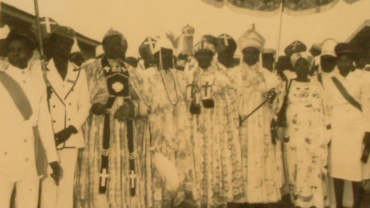In Ayetoro, leadership was never a matter of personal ambition or private inheritance. It was a sacred trust, grounded in faith and affirmed by the entire community. At the heart of this transfer of responsibility was a simple yet profound ritual: the handing over of the staff of authority. To receive the staff was to accept not only honour but also the weight of service, a reminder that in the Happy City, leadership meant accountability to God and people alike.
The staff itself was typically crafted from polished wood, unadorned yet dignified. Its simplicity reflected the Apostles’ belief that power did not lie in wealth or decoration but in humility and righteousness. Carried by the Ogeloyinbo or other appointed leaders during ceremonies, the staff stood as both a practical emblem and a spiritual symbol. It represented guidance, order, and the continuation of the covenant that bound Aiyetoro together since its founding in 1947.
Archival photographs from the 1950s and 1960s show the solemnity of these occasions. The new leader, dressed in white garments like every other Apostle, knelt or stood before the council of elders. The outgoing leader or senior Apostle extended the staff with both hands, while hymns rose from the gathered congregation. Witnesses recall the silence that often followed — a pause in which the significance of the moment was deeply felt by all present. When the staff finally passed into the hands of the new leader, the crowd erupted in song, marking not a transfer of power but a renewal of unity.
Oral testimonies emphasise that this ritual was not about personal elevation. The staff reminded the new leader that authority was borrowed, not possessed. It was held on behalf of the community, and always under divine watch. As one elder later explained: “When we handed the staff, we were not giving power. We were giving responsibility — the duty to lead with truth and humility.”
The staff also carried practical meaning. It was used to open ceremonies, to bless gatherings, and at times to symbolically separate disputing parties, reminding them of the need for peace. During processions, the staff was raised high as a sign that the community was united under shared leadership. Children, watching from the edges of the crowd, learned early that the staff was not a weapon but a covenant — one that bound leaders to serve.

Visitors to Ayetoro often remarked on the uniqueness of this ritual. In contrast to the hierarchical systems of colonial administration or traditional kingship elsewhere, Aiyetoro’s staff of authority symbolised a different kind of leadership — one rooted in equality, shared responsibility, and spiritual conviction. To many, it was evidence of the town’s innovative blend of faith and governance.
Though the physical staffs of the past may no longer remain, their symbolism endures in the community’s memory. They remind us that leadership in Ayetoro was never about personal gain but about carrying a burden for the collective good. To hold the staff was to walk a path of service, integrity, and humility.




